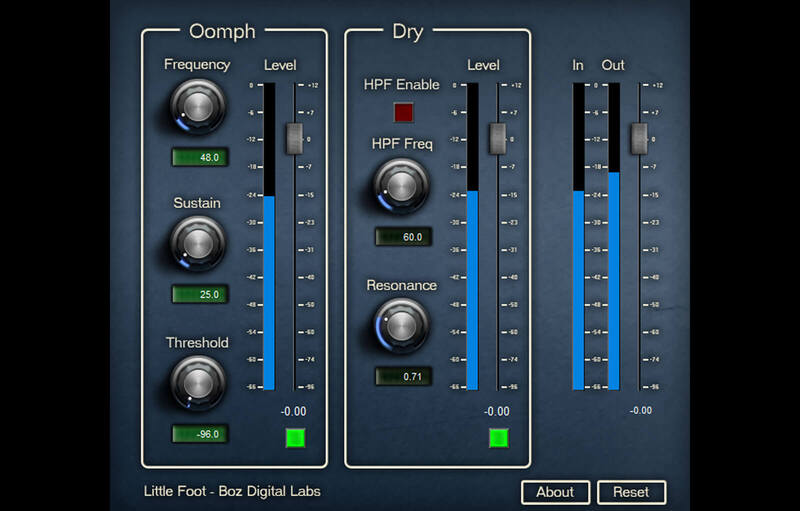Contrary to what the name suggests, Little Foot is only small in terms of CPU usage and focus.
The single-minded son of Boz’ Sasquatch 2 Kick Machine, it has just one job to do and it does it extremely well—that’s to put hair on your kick drum.
Little Foot takes sub-bass drops, a time-honored studio technique, refines and streamlines it, enabling you to seamlessly blend a tunable low-frequency sine wave with a kick drum for added power, punch, and deep low end—in one simple, straightforward GUI.
Not just for extreme lows, in these days of earbuds and iPhone speakers, you might want to bring out an octave above the fundamental in order for kick to be heard on tiny speakers. Little Foot can help you there, like no EQ can.
Boz Digital Labs Little Foot—Just the Facts:
- No-manuals-necessary layout
- Instantly add punch and body to your kick drum
- Easily go from natural enhancement to extreme sustain
- Tune your kick drum to match the key of the song
- No time-consuming scrolling through samples, no flams, no phase issues
- Very low CPU usage
Boz Digital Labs Little Foot—Cracking the Code
As every professional mix engineer knows beyond any doubt, you can’t EQ what isn’t there. If a producer tracked a drum kit using a 20″ kick drum with a single-ply resonant head, there’s not going to be very much going on in the sub frequencies. An old trick in the studios to bring out sub frequencies of a kick drum was not EQ, but rather to gate a low-frequency sine wave tuned to the drum’s fundamental to be triggered by the kick and sent to another channel for blending purposes. The combination of natural kick and low-frequency fundamental added “Oomph,” as Boz Digital calls it, without crazy boosts in EQ to eat up headroom.
The standard procedure for sub-bass drops is a tad complicated involving a CPU-hungry virtual instrument channel, aux channel, sidechain gating, busing, pre-fader sends to hear the effect in solo, high-pass filtering, and so forth.
With Little Foot, you get the effect without having to tweak noise gates for attack, hold, and release to get the proper sustain; no going back and forth between sine wave track and kick to check results; and no need for additional plug-ins to tune the sine wave or modify its envelope.
Little Foot lets you do all of that with one simple interface, plus it enables you to individually tune, add sustain, and level-control the “Oomph” signal, and treat the original kick for resonance (which is where the money is on drums). With Little Foot, all you have to do is drop it on your kick drum track and adjust to taste.
Little Foot—Big Easy
Being dedicated to kick drum enhancement greatly simplifies the user interface of Little Foot. Instead of trying to be all things to all low-frequency instruments, Little Foot gives you exactly what you need to craft your kick drum quickly and effectively.
Controls in the Oomph section include Frequency, Sustain, Threshold, and Level. Simply select the sub-harmonic frequency you wish to add, how long it will sustain (short for punch, long for fun), set the threshold to determine when it will kick in (see what we did there?), and set its level (less is more).
The Dry section alongside Oomph is where you dial in the natural sound. It gives you a variable high-pass filter to make room for the sub-drop; a resonance knob that lets you boost slightly above the corner frequency of the HP filter, which prevents the sound from thinning out while eliminating unneeded lows; and finally, a level control to dial in how much dry kick you need.
On the far right of Little Foot is an In/Out level meter and a main level slider in case you get carried away. Beneath these controls is a Reset button in case you lose perspective, and an “About” button, in case you want to meet your maker . . .
Nothing puts the fun back into fundamentals like Little Foot. Download a copy today and get down . . . all the way down.
Available Formats
- Win (32 and 64 bit): VST, VST3, RTAS, AAX Native
- Mac (32 and 64 bit): VST, VST3, RTAS, AU, AAX Native

















